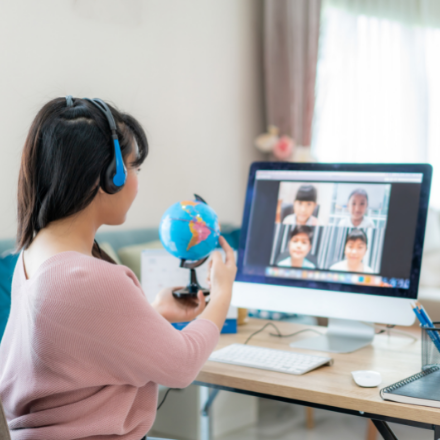Overview
Summary: In this guide, you’ll find out what a demo lesson is and what to expect. You’ll learn what kind of scenarios and materials you might receive and how to prepare for your demo. If you’re feeling a bit nervous about an upcoming demo lesson, expect this guide to put your mind at ease and prepare you for making a fantastic first impression. If you’ve already read our introductory video guide, this is our next recommended guide for you.
Topics you’ll cover:
> What is a demo lesson and what to expect
> Preparing for the demo lesson
> What happens during the demo?
> Getting feedback
> What happens next?
What is a demo lesson and what to expect?
In both in-person and online demo lessons, the employer wants to find out what you’re like in the classroom. They’ll be looking out for any number of specific criteria – from your facial expressions to your pronunciation to what you’re wearing – as well as your classroom management skills, teaching techniques and language awareness. It goes without saying that you’ll need to make a really good impression.
The school will always tell you the length of the lesson, the level and age of the students and any other important information in advance. Demo lessons can run in a few different ways, regardless of whether they’re online or not.
Materials you’ll need
You may be sent materials in advance or be provided with them on the day.
Materials sent in advance: here, you’ll receive materials for your lesson by email well before your interview. This means that you’ll have time to prepare for your lesson and put your spin on the materials. It also allows you to ask the employer if there’s something you don’t understand at this stage.
Materials provided on the day: in this case, you’ll usually be given some time to prepare before your demo lesson. ‘You’ll either be given materials to teach from or be given a page or two of a coursebook to prepare. Although this sounds quite scary, it means you can’t overthink what you’re doing – the only thing you can do is put what you know to good use!
Who are the students?
This is the tricky one.
In-person demo lessons
There’s every chance you will be teaching ‘real’ EFL students who go to the school. They might be attending your demo lesson without paying on top of their usual lessons there. This means you’ll get to show off your skills to a real class.
We’ve heard of cases where you might give a demo lesson to a member of the school staff, such as a receptionist. Here your student might pretend to have a lower level of English in order to make the lesson more effective. This might seem weird but it’s common practice. In some cases we know, candidates have unwittingly given demo lessons to the owner of the school who was using this method to vet who they were employing.
Depending on the situation, an observer may be in the room too. If so they’ll be watching you teach and making notes on the class. Don’t worry too much about the observer – they usually only take notes so they don’t forget things. In some cases, there won’t be an observer at all. Instead, the students will pass on their thoughts to the employer after the lesson.
Online demo lessons
Usually, when you are doing an initial online demo lesson, you won’t be teaching a real class but a ‘fake’ student, who is often an experienced teacher within the company.
This can sometimes be really weird – for example, the experienced teacher will adopt the mannerisms, accent and errors of a student. They might pretend to be a child or teenager or pretend to be from a different country and make lots of mistakes that they wouldn’t make in real life. If you’ve never done a demo lesson like this before, you might find it really off-putting and distracting. It’s best to just pretend that you’re speaking to a child – even if you’re not! This can be made all the stranger because the experienced teacher will speak to you normally before and after the demo lesson itself but slip into character in the middle!
Preparing for the demo lesson
Preparing your materials
If you’ve been given materials for your lesson in advance, it goes without saying that you’ll need to read them carefully and adapt them to best suit your teaching style. If possible, it’s best to print them off so you can write all over them and make any changes you need to. For new teachers, use what you’ve learnt on your TEFL course to help ensure the lesson will be logical. It’s a good idea to plan a lesson which is very communicative, student-led and ensures that students have learnt something new by the end of the lesson.
Researching the company
There are a few places you can look to see other people’s experiences when applying for jobs. Searching forums like Reddit or company review sites such as Glassdoor might bring up helpful anecdotes about what other people went through.
If you’re applying for an online job in a big company, it’s a good idea to have a look online for any demo lessons that have been uploaded. YouTube is a really good place to start – search for the company’s name and ‘demo lesson’ to see if there’s an example. If you don’t have any luck, there’s no harm asking the employer if they have a video you can watch to give you an example of what to expect.
Online considerations
Before you get into the online demo lesson, you’ll have to get set up and ready to teach online. This will usually include downloading some teaching software, playing around with the inbuilt tools and making sure your microphone and camera are working. It’s a huge advantage if you have a headset so that the employer can hear you clearly, rather than relying on the microphone built into your laptop – this can lead to quite muffled audio, which is made worse by echoes in the room you’re in.
You’ll also need to find an appropriate background to sit in front of – employers usually recommend a plain background, such as a plain wall, or something relevant to teaching, such as bookshelves or a map of the world.
If there’s anything you’re unsure about, ask the recruiter or employer for help or advice but only as a last resort. Where possible, research as much as you can yourself.
What happens during the demo?
At the start of the demo you’ll be introduced to the student – as we said before, this could be a real student or a recruiter pretending to be a child. Keep calm, keep smiling and do your best. It’s OK to be nervous. By preparing a professional background and getting to know the materials and software, you’ve done everything you can. That just leaves the teaching element! Speak slowly and clearly and ensure the student(s) understand everything before moving on. Pay particular attention to your instruction – giving too.
Getting feedback
After a demo lesson, expect to receive some feedback – this might happen immediately afterwards, it might be sent by email after the demo or both. The feedback will tell you whether or not your lesson was successful. If it was successful, you might be…application. Either way, you may also get some feedback on your performance and be given advice on how to improve.
The employer will be marking you against criteria, which will be different depending on whether your demo lesson was online or in person. In the case of online demo lessons, they’ll comment on things like the background you were sitting in front of to how effectively you used the tools in the lesson software.
If you had an in-person demo lesson, the feedback process will depend on who you were teaching real students, the observer will give their feedback either immediately or send it to you by email. If there was no observer, it might take a while for comments to pass from the students to the employer and then back to you.
As with all feedback on your teaching, read it carefully and make some actions points to help you improve next time.
What happens next?
In the exciting case that you are successful following your demo lesson, you will usually be offered the job and be given some further information or documentation, such as a contract or code of conduct for teachers. If not, you might be given the opportunity to complete a second demo lesson – if this is the case, the employers are looking to see that you have made improvements based on the feedback you were given.
If you are unsuccessful, you can use your experience and feedback to help you in your next demo lesson. There might be something unclear in the feedback or something you don’t really understand – in this case, ask the employer for clarification.
We hope this has been useful and has given you an insight into what teaching a demo lesson might be like. Although we can’t help you with your lesson planning, knowing what to expect might take away some of the fears of completing this stage of an application.





